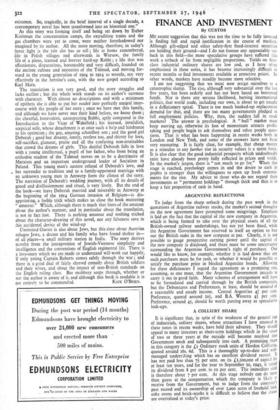FINANCE AND INVESTMENT
By CUSTOS
MY recent suggestion that this was not the time to be fully invested is finding full and rapid justification in the course of markets. Although gilt-edged and other safety-first fixed-interest securities are holding their ground—and I do not foresee any appreciable set- back in this field—the more speculative groups have suffered this week a setback of far from negligible proportions. Yields on first- class industrial ordinary shares are low and, as I have often emphasised in these notes, it has become increasingly difficult in recent months to find investments available at attractive prices. In other words, markets have steadily become more selective. I am not suggesting that we must now resign ourselves to a catastrophic slump. The rise, althougli very substantial over the last five years, has been orderly and has not been based on borrowed funds. Nor is there any serious likelihood, barring international politics, that world trade, including our own, is about to get caught in a deflationary -spiral. There is too much banked-up replacement dernand for that, and, there are too many governments pledged to full employment policies. Why, then, the sudden. fall in stock markets? . The answer is psychological. A " bull". market must keep moving up; otherwise its loss of momentum attracts profit- taking and people begin to ask themselves and other people ques- tions. That is what has been happening in recent weeks both in London: and New Yotk, and some of the answers have not been very reassuring. it is -fairly clear, for example, that cheap money as a stimulus to any further rise in security values is a spent force. It is also clear that the good industrial prospects which undoubtedly exist have already been pretty fully reflected in prices and yields. In the market's jargon, there is " not much to go for." When this stage is reached, psychology comes in and the desire to cash in profits is stronger than the willingness to open up fresh commit- ments for the rise. My advice to those who do not regard their investments as " permanent holdings " through thick and thin is to keep a fair proportion of cash in hand.
ARGENTINE REFLECTIONS To judge from the sharp setback during the past week in the quotations of Argentine railway stocks, the market's second thoughts on the new agreement have prompted some- misgivings. Emphasis is laid on the fact that the capital of the new company in Argentina, which is being formed to take over the physical assets of all the British-owned railway undertakings, has not yet been fixed, while the Argentine Government has reserved to itself an option to buy out the British stake in the new company at .par. Clearly, it is not possible to gauge prospective earning power until the capital of the new company is disclosed, and there must be some uncertainty surrounding the Argentine Government's right of purchase. One would like to know, for example, whether it is laid down that any such purchases must be for cash, or whether it would be possible to satisfy the purchase pfice in blocked Argentine bonds. Allowing for these deficiencies I regard the agreement as a promising one, assuming, as one must, that the Argentine Government intends to carry it out in good faith. Many schemes of arrangement will have to be formulated and carried through by the British companies, but the Debentures and Preferences, at least, should be assured of a reasonable and steady income. Central Argentine 41- per. cent. Preference, quoted around zof, and B.A. Western 4-I per cent. Preference, around 45, should be worth putting away as speculative lock-ups.
A COLLIERY SHARE It is significant that, in spite of the weakness of the general run of industrials, colliery shares, whose attractions I have stressed in these notes in recent weeks, have held their advance. They should appeal to many investors as short-term holdings which in the space of two or three years at the outside will become resolved into Government stock and subsequently into cash. A promising share in this category is the LI Ordinary stock units of Horden Collieries, quoted around 26s. 6d. This is a thoroughly up-to-date and well- managed undertaking which has an excellent dividend record. It has not paid less than 71 per cent. on its L1,500,000 of capital for at least ten years, and for the year to September 3o, 1945, it raised its dividend from 8 per cent. to _to per cent. The immediate yield is therefore about 7 per cent. At this stage nobody can do more than guess at the compensation which the company is likely 10 receive from the Government, but to judge from the company's past record and its ownership of over 2,000 acres of freehold land, coke ovens and brick-works it is difficult to . believe that the shares are overvalued at today's price.


























 Previous page
Previous page